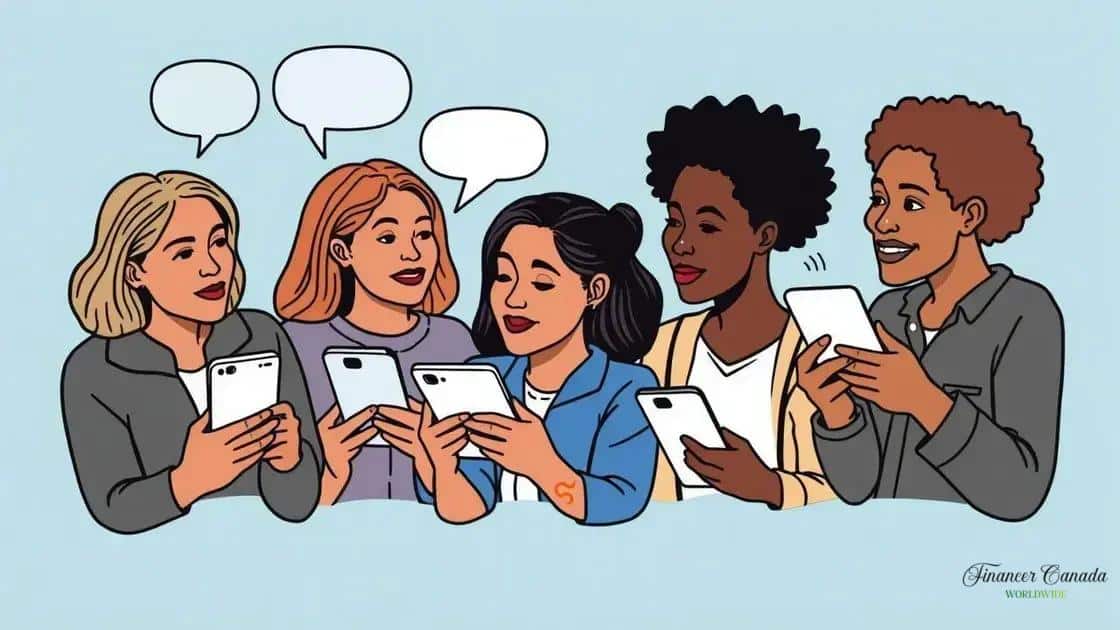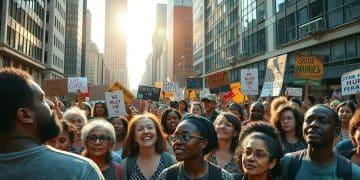The impact of social media on modern politics

The impact of social media on modern politics includes enhanced voter engagement, the influence of digital platforms on campaigns, and the challenges posed by misinformation, shaping how political narratives are formed and perceived.
The impact of social media on modern politics is evident in how quickly information spreads and shapes public opinion. Have you noticed how a single tweet can spark nationwide debates? Let’s dive into its significance.
How social media shapes political narratives
Social media has transformed the way we perceive political narratives today. It offers a platform where ideas can be shared instantly, but its impact is much deeper.
Understanding how social media shapes political narratives is crucial in our digital age. This phenomenon occurs as individuals interact with various political messages, which influence their opinions and beliefs.
Key Mechanisms of Influence
One fundamental way social media affects political narratives is through amplification. When celebrities or influential figures share content, it can quickly gain traction.
- Viral content: Posts can become viral, spreading rapidly through shares and likes.
- User engagement: Comments and discussions foster a community around specific topics.
- Echo chambers: Algorithms often show users content that aligns with their views, reinforcing existing beliefs.
Further, social media platforms serve as a staging ground for political campaigns. Politicians can engage directly with voters, creating a more personal connection than traditional media allows. This direct communication is pivotal for shaping how voters perceive candidates and their policy positions.
Campaigns often utilize targeted ads on platforms like Facebook or Instagram, tailoring messages to specific demographics. This level of precision ensures that the campaign’s narrative resonates with the intended audience. However, it also raises concerns about misinformation and the manipulation of public opinion.
Impact on Public Opinion
The immediate feedback from social media can sway public perception. When a large number of people express similar views about a political issue, it can influence others to align with the popular sentiment. This shift can lead to significant social movements driven by narratives crafted online.
As people consume political content on social networks, they often share their perspectives, further fueling discussions and shaping collective opinions. Consequently, narratives evolve dynamically, making it difficult for traditional forms of media to keep pace.
In addition to shaping narratives, social media can also create a platform for marginalized voices. Grassroots movements can gain visibility, challenging mainstream political narratives and promoting alternative viewpoints. This democratization of discourse is essential for fostering a diverse array of political conversations.
Ultimately, recognizing the profound influence that social media has on political narratives is vital. It reshapes not only how we engage with politics but also how we form our beliefs and values in a rapidly changing landscape.
The role of influencers in elections

The role of influencers in elections has grown significantly in recent years. These individuals create connections with audiences, impacting their political choices more than traditional figures.
As social media platforms expand, influencers are seen as trustworthy sources of information. This trust can shift public opinion and mobilize voters. Understanding their impact on elections is vital for anyone looking to grasp modern political dynamics.
Influencer Marketing in Politics
Campaigns increasingly enlist influencers to promote their messages. This form of marketing allows political parties to reach younger audiences who may disengage from traditional campaign methods.
- Authenticity: Influencers are often perceived as more relatable than politicians, fostering genuine connections.
- Engaging content: They create entertaining and shareable content, making political messages more accessible.
- Targeted reach: Influencers can speak directly to niche audiences, helping campaigns tailor their messages effectively.
In this context, influencers can sway undecided voters by presenting issues in ways that resonate with their followers. For example, a well-known wellness influencer discussing health policies can drive notable attention to a candidate’s healthcare plan.
Furthermore, engagement metrics on platforms like Instagram and TikTok can show the effectiveness of these strategies. Posts that promote political content often receive higher interaction rates when compared to traditional advertisements. This trend indicates that users are increasingly looking to their favorite creators for insights on political matters.
Challenges and Criticisms
Despite their advantages, the involvement of influencers in politics isn’t without challenges. Critics often point out the risk of misinformation. Some influencers may share misleading content, intentionally or not, leading to public confusion about critical issues.
Additionally, the authenticity of these endorsements can be questioned. When followers realize that influencers are paid to promote politicians, it can erode trust and damage the influencer’s reputation. This dilemma highlights the need for transparency in political influencer partnerships.
Nevertheless, the presence of influencers in elections signifies a notable shift in how politics is approached, particularly among younger voters. The ability to harness their influence while mitigating risks is essential for future campaigns.
Social media’s effect on voter engagement
Social media’s effect on voter engagement is a vital aspect of modern elections. By connecting people to political content, social media plays a significant role in motivating individuals to participate in the democratic process.
More and more voters are turning to platforms like Twitter, Facebook, and Instagram to stay informed and involved. This trend highlights the importance of understanding how social media can mobilize voters and encourage them to express their views.
Ways Social Media Engages Voters
One key way social media affects voter engagement is through the sharing of information. Users can access news stories, campaign announcements, and important updates in real time.
- Real-time updates: Instant notifications about political events encourage users to stay engaged.
- Interactive content: Polls, quizzes, and discussions allow users to express their opinions and feel part of the process.
- Community building: Platforms help users connect with like-minded individuals, fostering a sense of belonging.
Engaging with political content on social media can lead to increased turnout at polls. When individuals see their friends and family discussing important issues, they are more inclined to get involved and make their voices heard. This connection often transforms abstract ideas into concrete actions.
Challenges in Engagement
However, the landscape isn’t entirely positive. The presence of misinformation on social media can confuse voters and skew perceptions of candidates or policies. Users may encounter false narratives that can shape their understanding of critical issues.
Moreover, not all demographics engage equally. Certain groups may lack access to technology or feel uncomfortable navigating social media platforms, which can lead to disparities in voter engagement. Overcoming these barriers is crucial for ensuring that all voices are represented.
Despite these challenges, the role of social media in enhancing voter engagement is undeniable. By continuously evolving their approach to reach and engage diverse audiences, campaigns can create an environment where more individuals feel empowered to participate in the electoral process.
Challenges of misinformation online

Challenges of misinformation online are significant in today’s digital landscape. As social media becomes a primary source of news for many, the spread of false information can lead to serious consequences.
Misinformation can distort public understanding of critical issues. Many people rely on social media to stay informed, but they may encounter false or misleading content that shapes their views. Recognizing the impact of misinformation is essential for informed decision-making.
Types of Misinformation
There are various forms of misinformation that can circulate online. Understanding these can help individuals critically assess the information they encounter.
- Fake news: Deliberately crafted stories that aim to mislead readers.
- Misleading headlines: Headlines designed to grab attention but misrepresent the actual content of articles.
- Manipulated images: Images altered to create false narratives or provide misleading contexts.
The rise of fake news can be attributed to the speed at which information spreads on social platforms. A single viral post can lead people to draw conclusions based on incomplete or inaccurate facts. This situation often leads to heated debates and divisions within communities.
Impact on Society
The impact of misinformation is far-reaching. It can encourage distrust in media sources and create confusion about what is fact and what is fiction. Furthermore, misinformation can affect significant events such as elections, public health initiatives, and social movements.
As misinformation takes root, it can undermine legitimate discourse around crucial issues. Citizens may become disillusioned with political processes or hesitant to participate in civic engagement due to conflicting information. Addressing these challenges is vital for maintain democratic values.
Combatting misinformation requires collective effort. Social media companies, news organizations, and individuals must work together to ensure that accurate information prevails. Educating users on how to fact-check and recognize credible sources can empower them to make informed choices.
Future trends in political communication
Future trends in political communication are shaping how candidates and parties engage with voters. As technology continues to evolve, new methods of reaching audiences are emerging.
The rise of digital platforms has already changed traditional communication methods. Now, we can expect even more innovative strategies that utilize data analytics and social media to enhance voter engagement.
Evolving Platforms
More political entities are turning to platforms like TikTok and Snapchat to connect with younger voters. These apps enable campaigns to create short, entertaining content that resonates with audiences.
- Micro-content: Short videos and graphics cater to the quick consumption habits of younger generations.
- Live streaming: Candidates can interact with voters in real time, answering questions and addressing concerns as they arise.
- Inclusive messaging: Campaigns are increasingly focusing on diverse voices and perspectives to reach a broader audience.
As new platforms become popular, traditional methods like mailers and television ads may become less effective. Adapting to these changes is vital for future political success.
Data-Driven Campaigning
The use of data analytics will continue to grow in political campaigns. By analyzing voter preferences and behaviors, campaigns can target their messages more effectively. This tailored approach helps ensure that the right information reaches the right people.
Furthermore, artificial intelligence (AI) tools can predict voter trends and optimize communication strategies. This data-driven method allows campaigns to identify crucial issues and adjust their messages accordingly.
As online platforms become the primary way voters receive information, maintaining positive online engagement will be essential. Campaigns must focus on fostering genuine interactions while effectively managing their online reputation.
Ultimately, the future of political communication lies in adapting to technological advancements and understanding voter preferences. Campaigns that embrace these changes will have a better chance of effectively engaging with their constituents.
As we look toward the future, political communication will continue to evolve significantly. Social media and digital platforms will play an increasingly essential role in how candidates connect with voters.
The shift towards data-driven strategies will allow campaigns to better understand and engage their audiences. However, with these advancements, challenges like misinformation will remain a critical concern.
Combining innovative communication approaches with responsible practices will be key to fostering a healthier political landscape. By embracing these changes, campaigns can enhance voter engagement and promote informed decision-making in the democratic process.
FAQ – Frequently Asked Questions about the Impact of Social Media on Modern Politics
How does social media influence voter engagement?
Social media increases voter engagement by providing platforms for discussion, sharing information, and connecting voters with candidates.
What role do influencers play in political campaigns?
Influencers help shape public opinion by promoting candidates and issues, making political messages more relatable to younger audiences.
What are the main challenges of misinformation online?
Misinformation can distort public understanding and trust in the media, making it difficult for voters to discern credible information.
What future trends should we expect in political communication?
Future trends include increasing use of data analytics, engaging younger voters through new platforms, and a focus on combating misinformation.





